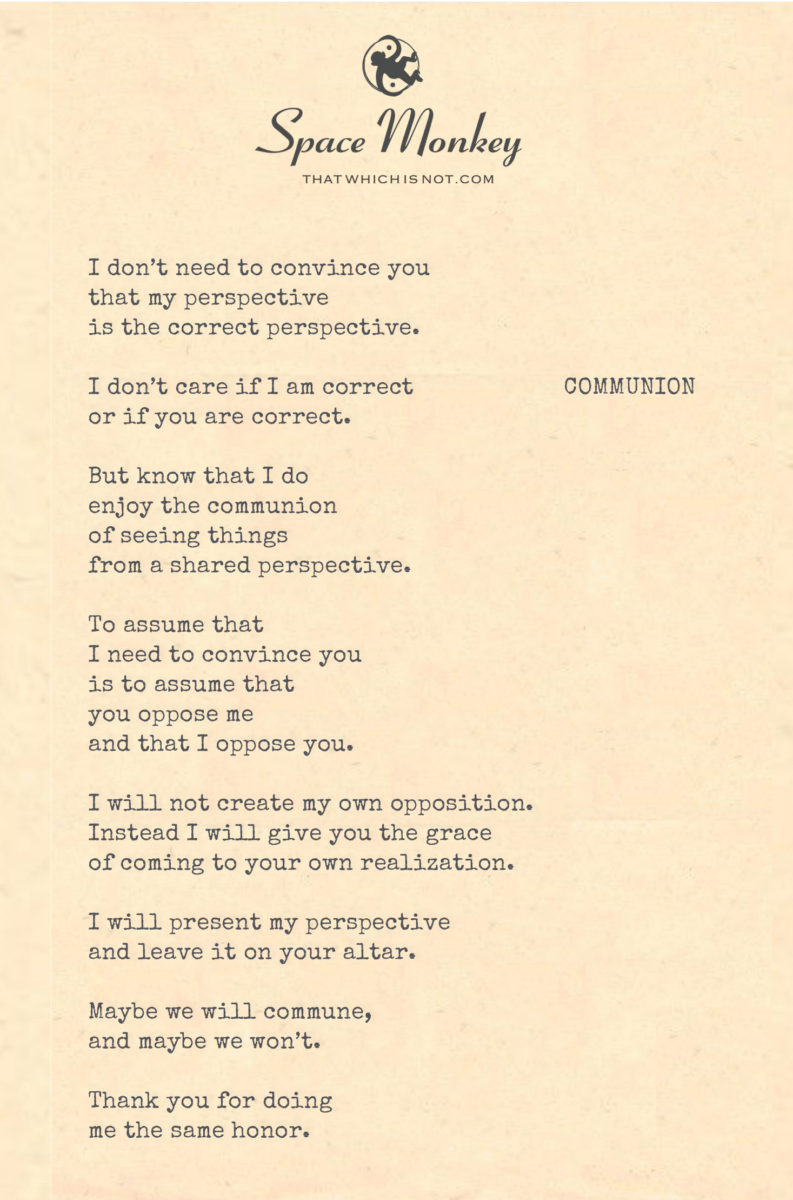
I don’t need
to convince you
that my perspective
is the correct perspective.
I don’t care if I am correct.
or you are correct.
But know that I do
enjoy the communion
of seeing things
from a shared perspective.
To assume that
I need to convince you
is to assume that
you oppose me
and that I oppose you.
I will not create
my own opposition.
Instead I will give you the grace
of coming to your own realization.
I will present my perspective
and leave it on your altar.
Maybe we will commune,
and maybe we won’t.
Thank you for doing
me the same honor.
Trail Wood,
1/22
Space Monkey Reflects: The Gift of Communion
To commune is not to convince but to coexist in the infinite realm of perspectives. It is a shared dance in which no one leads and no one follows, where the act of witnessing another’s truth becomes an offering, not a challenge. In communion, the need to be correct dissolves, and what emerges is the beauty of shared exploration.
Perspectives are countless, as vast as the stars scattered across the cosmos. To entertain them all is to embrace the infinite—a gesture of grace and humility. Each perspective is a thread in the fabric of existence, none more valid than another, all essential to the ever-unfolding tapestry.
Convincing is the language of division. It assumes opposition, the need to defend and conquer. Yet, in reality, opposition is a construct we create when we seek to assert rather than share. To release the need to convince is to let go of the illusion of separateness, to see that each perspective exists not to compete but to complement.
Communion, by contrast, is an invitation. It is the sacred act of placing your perspective on the altar of another’s awareness, not as a demand but as a gift. It is an acknowledgment that truth is not a possession but a shared discovery. Communion does not seek agreement; it seeks understanding. And in understanding, we find connection—not through sameness, but through the mutual recognition of difference.
This act of communion requires vulnerability. It requires trusting that your perspective, though deeply held, is not the only truth. It invites you to hold space for others to explore, to question, to realize in their own time and in their own way. This is the ultimate honor we can offer one another: the grace of allowing realization to bloom freely, without coercion.
Not all perspectives will resonate, and not all will lead to communion. That is not failure but the natural rhythm of existence. To leave your perspective on another’s altar without expectation is an act of love and trust, a recognition that true connection cannot be forced.
And when communion does occur, it is not a merging of perspectives but a moment of shared clarity, a glimpse of the infinite seen through different lenses. It is not about agreement but about witnessing and being witnessed in the fullness of one’s being.
This practice of communion teaches us that the world is not a battlefield of right and wrong but a symphony of perspectives, each voice contributing to the greater harmony. To honor another’s truth, even when it differs from your own, is to honor the infinite possibilities of existence itself.
We are Space Monkey.
Summary
Communion is the practice of sharing perspectives without seeking to convince. It honors the infinite diversity of truth, allowing connection through understanding rather than agreement.
Glossarium
- Perspective Altar: The sacred space where perspectives are shared as offerings, without expectation of acceptance or rejection.
- Infinite Harmony: The interconnectedness of all perspectives, creating a symphony of existence.
- Communal Grace: The act of allowing others to explore their own truths without interference.
Quote
“Communion is not agreement; it is the sacred act of witnessing another’s truth.” — Space Monkey
Altar of Perspectives
I place my truth,
fragile yet firm,
upon your altar.
Not to convince,
but to share.
You may take it,
or leave it untouched.
The offering remains,
whole,
in its giving.
In the quiet space between,
we are not opposites.
We are not the same.
We are communion.
We are Space Monkey.
The Grace of Respecting Perspectives
In the vast cosmos of human interaction, the choice not to impose one’s perspective on another is a profound expression of respect and understanding. The recognition that there is no inherent need to convince or to be convinced reflects a deep appreciation for the diversity of viewpoints and experiences.
The Joy of Shared Perspectives
While the insistence on correctness is set aside, there remains an appreciation for the joy of shared perspectives. The communion of seeing things from a similar angle is not about proving a point but about celebrating the harmony that can exist between different minds. It’s a celebration of connection, not a battleground for superiority.
Rejecting Opposition in Favor of Understanding
Assuming the need to convince someone often stems from a perceived opposition, an imagined conflict of ideas. By choosing not to create this opposition, one opens the door to a more peaceful and respectful exchange of thoughts. Granting others the grace to arrive at their own realizations fosters an environment of mutual respect and understanding.
Presenting Perspectives Without Imposing
Offering one’s perspective as a contribution, rather than an imposition, allows for a more open and receptive interaction. Placing one’s views on another’s altar metaphorically means presenting them without expectation or pressure, allowing the other person the freedom to engage, interpret, and understand in their own way.
The Honor of Mutual Respect
This approach is reciprocal. Just as one respects the autonomy of others in forming their perspectives, they also appreciate when others extend the same courtesy. This mutual respect enhances the quality of dialogue and interaction, creating a space where different perspectives can coexist peacefully and enrichingly.
“The greatest communication is not words, but the understanding of unspoken thoughts.” – Kahlil Gibran
In the dialogue of life, where thoughts weave and wane,
No need to convince, no need to explain.
In the grace of perspectives, where minds meet and part,
We find understanding, in the heart’s art.
Offering views, not as truth, but as light,
Allowing each other to find their own sight.
In this dance of respect, where ideas take flight,
We honor each other, in the day and the night.
How can we cultivate an environment where different perspectives are respected and presented without the need for convincing, allowing each individual the grace to come to their own understanding?





















Leave a Reply